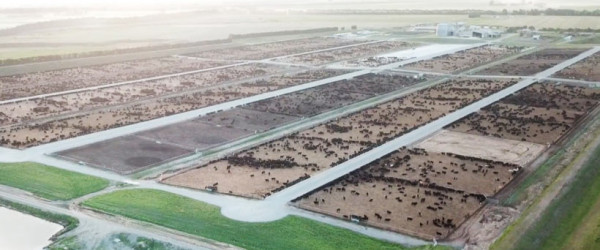
What future for feedlots?
October 23rd, 2018Drone footage released by SAFE this week revealed the jaw-dropping scale of the Wakanui feedlot in Canterbury. The film was met by widespread disgust from Kiwis, who were shocked to see American-style intensive zero-grazing operations, right here in New Zealand. Their outrage grew when they found out how widely this so-called ‘premium beef’ is being sold in supermarkets and restaurants.
But the industry hasn’t been happy, either. Beef & Lamb CEO Sam McIvor did his best to defend this appalling way of fattening up cattle, where animals are crammed together in barren pens with no shelter or grass, and are instead fed an unnatural diet. He continually tried to steer the conversation away to talk about other methods of beef farming, where cattle are only kept in grass paddocks until they’re slaughtered.
At the same time, ANZCO, which owns the feedlot, seems to have gone into hiding. They have repeatedly refused to speak to media, and when their former general manager offered to front up, he wasn’t given permission to speak by ANZCO. Curious!
The list of suppliers on ANZCO’s Wakanui Beef website has also mysteriously disappeared since Monday. The 35 retailers and 138 restaurants, who were previously proudly displayed on the page, are no longer listed. However, in the spirit of keeping people informed, and as we’ve had so many requests asking who is selling the feedlot beef, the list is provided at the bottom of this page.
Retailers take notice of public opinion. With enough of us telling them what we think of feedlots, their supplier – ANZCO – and the rest of the industry using feedlots might look at less cruel methods of beef production.
What about the environmental costs?
The good news is the Environment Minister David Parker doesn’t look kindly on feedlots. A couple of years ago he described them as “battery beeflots,” saying, “They really do look like the beef equivalent of chicken.”
However, the Minister’s mainly concerned about the pollution from the many feedlots around New Zealand, as opposed to the animals. He’s especially worried about those with no treatment of waste, wherein the owners are allowing concentrated cattle effluent to seep into streams, rivers and aquifers. He says he struggles to know how some feedlots are legal.
David Parker is not the only one with big concerns over feedlots and feedpads(1).
Ecologist Dr Mike Joy has said, “There is no way around it, no matter what you feed them, on a concentrated feed pad nitrogen levels will be thousands of times more than plant roots could possibly absorb. If plants aren’t taking it up, it is going to the environment and doing damage.”
In the Hawke’s Bay, a businessman is taking the council to the Environment Court for failing to monitor and control the feedlots adequately in that region. Greenpeace is campaigning to end the intensification of the dairy industry in Canterbury’s Mackenzie Basin. They are also asking the Minister to stop all new dairy conversions and intensification of existing livestock farming by making them both prohibited activities, effective immediately, in the National Policy Statement for Freshwater.
Feedlots and other intensive farming practises are not what we want in Aotearoa. If enough of us act, together we will put an end to feedlots.
Take action:
- Email to end feedlots – Contact Hon David Parker, asking him to end feedlots.
(1) A ‘feedpad’ is a loosely defined area used on many farms to feed animals and/or give them time standing off damp pasture. Feedpads are used predominately in the dairy industry, but may also be used by beef farmers. There is limited regulation or monitoring around the use of feedpads and significant concerns in some areas that they are being used as feedlots.
